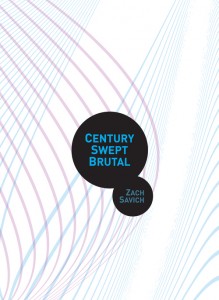Book Review
 For all its vibrancy, I can’t call Zach Savich’s Century Swept Brutal a feat of word-love, or action through words, or of elegant narrative, or even of discovery. Instead, in this unusual collection, we are distinctly and revolutionarily post-.
For all its vibrancy, I can’t call Zach Savich’s Century Swept Brutal a feat of word-love, or action through words, or of elegant narrative, or even of discovery. Instead, in this unusual collection, we are distinctly and revolutionarily post-.
In the new consciousness, we’re like babies, learning and experiencing not by seeking and discovering (acts of will) but by immersing ourselves (passive, receptive, struck by wonderment) in givens—givens we may not yet understand, but can therefore, perhaps, experience more fully.
he knows only
one song
at a time
figures the chords
of what he doesn’t
and somehow
the words will be revealed.
This is why the poet is post-: he’s moved past acts of willful understanding and begun to strut and stalk and weave and wrench himself open in the cosmic weather of several extra dimensions, which mostly serve to close the imagined gaps between things we had understood as separate. He absorbs and shapes that which he does not yet know—and what better purpose for poetry than to pioneer?
In the quick, torqued synapses between once-knowns, we are “Free of anything / except what / it’s like now.” Even causality, one of our favorite old-world givens, breaks down in the flashing of Savich’s electrical consciousness: “Trust in the seasons / does not allow / this fruit leaping / from a kicked stump.”
We can’t take it with us, the old order, because we’re all already here, where “You can play the newest tune / on absolutely any instrument.” The voice seems aware of its charged and simultaneous reality, where all things are themselves and others at all times, and the voice almost chastises itself for dragging its feet: “As usual, I wanted to see the water and sky as separate / forms of I don’t know what.” We get to feel a little better if we’ve been slow to get on the quantum bus.
Similarly, despite the charged, compressed, I’ve-just-come-through-a-black-hole intellect that zings around the collection, there are many moments of old-world beauty, where images linger instead of vaporizing into light and more light, form and more form. They stay within their given selves, mostly, sometimes, and the contrast serves as a well-deployed dose of near-nostalgic pleasure: “thread it / to trellis frames like broad beans / climb, to fashion little sails / yellowing at the edges / they slip around hollering / EXEUNT at the orders of / the eldest, a river throated / man, eyes small as salt.” Sure, the image is quick, and a little slippery, with its complicated relationship to syntax, and, as many of Savich’s delicate and rich images do, it likes to slip out from under your fork like a grape in a salad, but it’s there: the nugget of familiarity, even elongated and encouraged to stick around by gentle sound-craft. The poet knows we need tangibles in our suitcase to get through the emigration into the blinding brightness of Everything.
Notice, also, the “man, eyes small as salt.” This could easily be our pilot in this collection. There’s a concern for eyes and seeing (“gumminess / at the base of the eye / of a turtle”; “Tapestry showed / red lines meaning we are / behind the eyes”; “I couldn’t tell the plain / cave drawings / from the eyes I descended with”), but ultimately Savich does a difficult thing and lets go of these traditional engines for poems (seeing, body, sensation), happens upon the painful, post-human, startling crux: body, form –self—can only ever be secondary, because they’re constructs, built on the figment of changelessness, and so: it’s only the now that is real. Perhaps that’s where the occasionally dizzying, near-reckless quickness of these poems comes from, where I felt myself coming up short– but then it seems that Savich probably hasn’t missed that either: “There can be no meditation / now that you are about to look away,” he writes, perhaps charting even his own near-frenzied movements.
The recognition that structure can’t bind us to what we love or keep it around, that form is only momentary, arrives first as a joke, a pretty good one: “You hear the one about the pioneer who, chagrined, / unwrapped his mail-order bridge?” In the joke, a figure has ordered up an idea (things we cleave to in the old world, things that comfort us), and instead he’s gotten a structure (the mechanism, all things as mechanism). It’s funny, and sad. Even “the motions / in the heads of small birds” are “not looking or to hunt but / architectural”. Where can one go from this undone, mismatched place, where all has condensed and cooled into mere structure, the material habit of the universe?
Instead of just clinging to self, or sound, or image, “in a gesture they think is their name,” retelling our favorite assumptions in ever-prettier packages, Savich empties out the stage entirely. We move into the spacious music of the let-go, the post-: “The flute is the bone of something without organs” he writes; “its sound is what breath unobstructed through you should compose.”
If you want a taste of the beauty of our clumsy human limitations and desires, cut through with the clean freedom of the nothingness from which all things spring, you will be richly rewarded in this collection, and may find yourself meditating on it as you would on an ancient text.
Savich may very well be a contemporary mystic; it’s clear that this voice is of “the salt beneath the sheen.”
About the Reviewer
Caroline Manring's Manual for Extinction won the 2012 National Poetry Review Prize. A graduate of the Iowa Writers' Workshop, she lives, writes, and teaches from Ithaca NY with the help of her husband and a parrot named Jim.